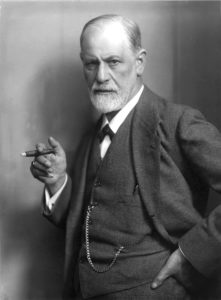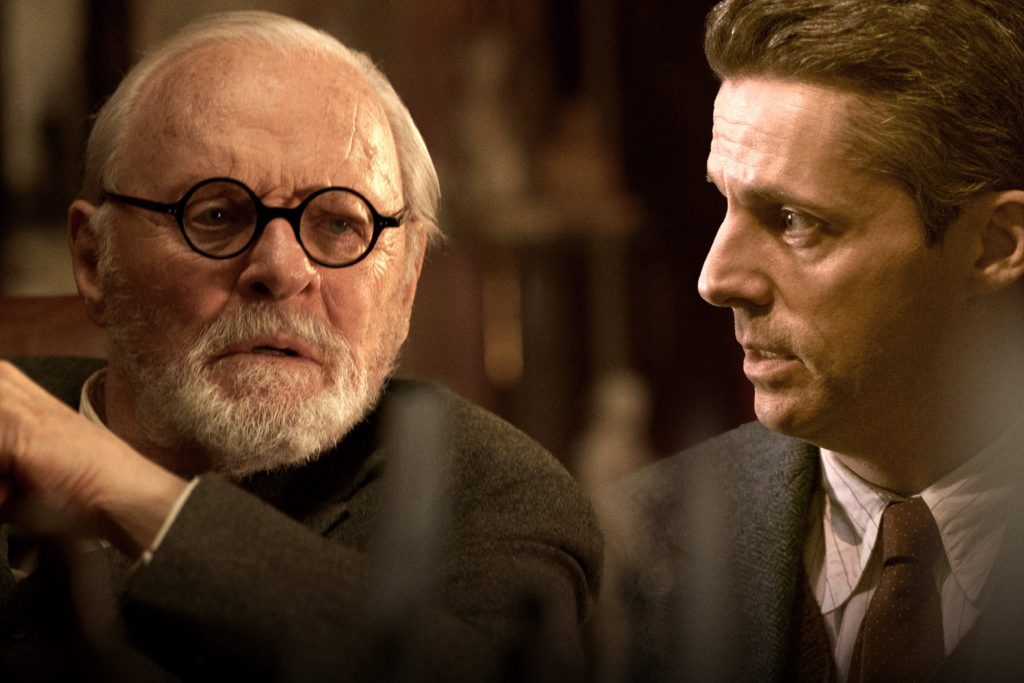In 1939, on the eve of World War II, a Jewish psychiatrist named Sigmund Freud moved to London to escape the Nazi persecution in his native Vienna. Three weeks before his death, the famed inventor of psychoanalysis met with an unidentified Oxford professor in his apartment and conversed with him at length. To this day, we still do not know the identity of his visitor.
American playwright Mark St. Germain wrote a play imagining that the professor was C.S. Lewis — the famous scholar, philosopher, Christian apologist, and author of “The Chronicles of Narnia.” The script has been adapted for the new feature “Freud’s Last Session,” which opened in theaters Dec. 22.
The most pressing topic in this fictional chat is, of course, the existence of God.
In the film, Lewis has recently returned to Christianity under the influence of his friend J.R.R. Tolkien, while Freud has emerged as one of society’s most ardent atheists, claiming that religion is a figment of people’s imagination, a projection of their desire for protection and guidance, and a reflection of their relationship with their fathers.
The conversation is set against a dramatic backdrop: London is preparing for airstrikes, trains full of children are being evacuated. Meanwhile, Freud is terminally ill with cancer and has already given his doctor instructions for his eventual euthanasia.
In the hands of lesser talent, this project could easily have been a disaster. But fortunately for us, the great Anthony Hopkins doesn’t try to give us an impression of Freud — his Freud is a man, not a mask. Matthew Goode’s elegant, sharp portrayal of Lewis is just as effective at bringing out the humanity of his character (ironically, Hopkins played Lewis 30 years ago in the classic film “Shadowlands”).
The film’s premise is attractive but also dangerous, inviting at least three significant risks.
The first would have been to reduce an exceptionally complex intellectual debate into some sort of rhetorical showdown; the second would have been to take sides between the two men, turning the movie into an apology of one side or the other. The third would have been to make an impossibly boring film: philosophical debates make for great university classes, but for a movie one needs action, plot, and character.
Somehow, “Last Session” manages to avoid all three. It is a film that does not tell you what to think about God — it tells you how to think about him. In other words, it shows what elements should be put into the equation required to solve the “God problem.”
The characters’ discussion of God (and many other subjects) is not just an exchange of learned opinions, but features flashbacks and references to their own lives. Freud, for example, tackles the problem of suffering (a theme Lewis dedicated entire books to) by recalling the premature death of his daughter and grandson. The issue of paternity and the father-son relationship is discussed with reference to the two characters’ fathers, and to Freud’s own relationship with his daughter, Anna.
The result demonstrates an important truth: that the question of God is inextricably linked with how we interpret the facts, the events of our lives. As Lewis suggests at the end of the film, God is everywhere, the world is crowded with him, yet he is incognito. We can recognize his presence or be completely blind to it, depending on our disposition.
In this “Last Session,” both characters get to play the role of the analyst, and both recline on Freud’s famous couch as patients. Both are faced with the discrepancies between what they preach and how they live, and the film does not shy away from the most controversial aspects of their lives.

At the time, Lewis lived with a much older woman, the mother of a friend deceased in World War I. Questioned by Freud about this relationship, Lewis refuses to provide a definitive answer, but the film seems to imply they were lovers (a topic of disagreement among Lewis’ biographers).
The film is merciless in its portrayal of Freud’s dysfunctional relationship with his last daughter, Anna, who followed in his footsteps to become a major figure in child psychoanalysis. Her relationship with him, as Freud himself admits to Lewis, is at the root of her lesbianism, of which Freud disapproves. He blocks the advancement of her career, keeps her away from relationships with both men and women, and tyrannically demands her constant presence and attention.
It does not take a Dr. Freud to understand she needs a break from him, but Freud selfishly denies her the freedom his treatment is supposed to provide.
But the most important element in the equation arrives when the discussion shifts to the topic of Freud’s impending death. “You believe you can outthink your fear by hiding behind your desk in your den of gods. But the truth is you are terrified,” Lewis attacks.
But Freud reminds Lewis of his terror in front of death in a previous scene, when the two took refuge in a bomb shelter during what turned out to be a false air-raid alarm. You did not seem too eager to meet your creator then, Freud adds.
“Because you know beyond all your fairy tales that he does not exist,” Freud tells him. “You see, you bury your doubts, your memories of the war, but at the core of your being, you are a coward. We are all cowards before death.”
Thankfully, this film will be a disappointment to those who wanted to see Lewis destroy Freud and his arguments (or vice versa). If there’s one takeaway from “Last Session,” it’s that it is imperative for each man to question himself about the existence of God — and that finding the answer is not easy.
As Freud understood, we are all conditioned by our desires, traumas, and complex personal histories, and tempted to fashion a god with the attributes of our earthly fathers. Lewis, for example, grew up with an absentee father, leading him to search for a father in heaven to replace his missing one.
But the same preconditioning, the film suggests, goes in the opposite direction. Freud’s hatred of his father compelled him to deny the existence of God no less than Lewis’ desire for a father figure prompted him to imagine a divine one.
By the end of the film, Freud admits that “it was madness to think that we could solve the greatest mystery of all times.” “There is a greater madness,” Lewis replies, “not to think of it at all.”
“The real trouble” he adds, “is to come awake, to stay awake” to the possibility of his existence. This intelligent film can help with this endeavor.

